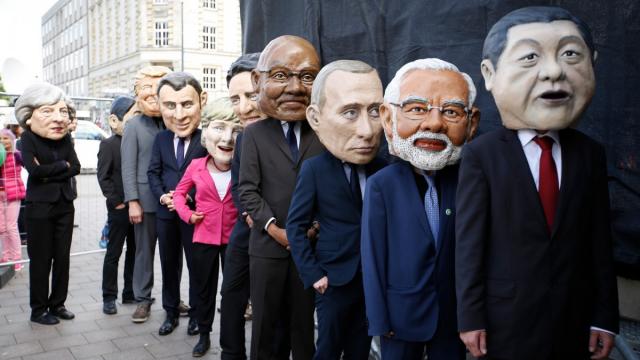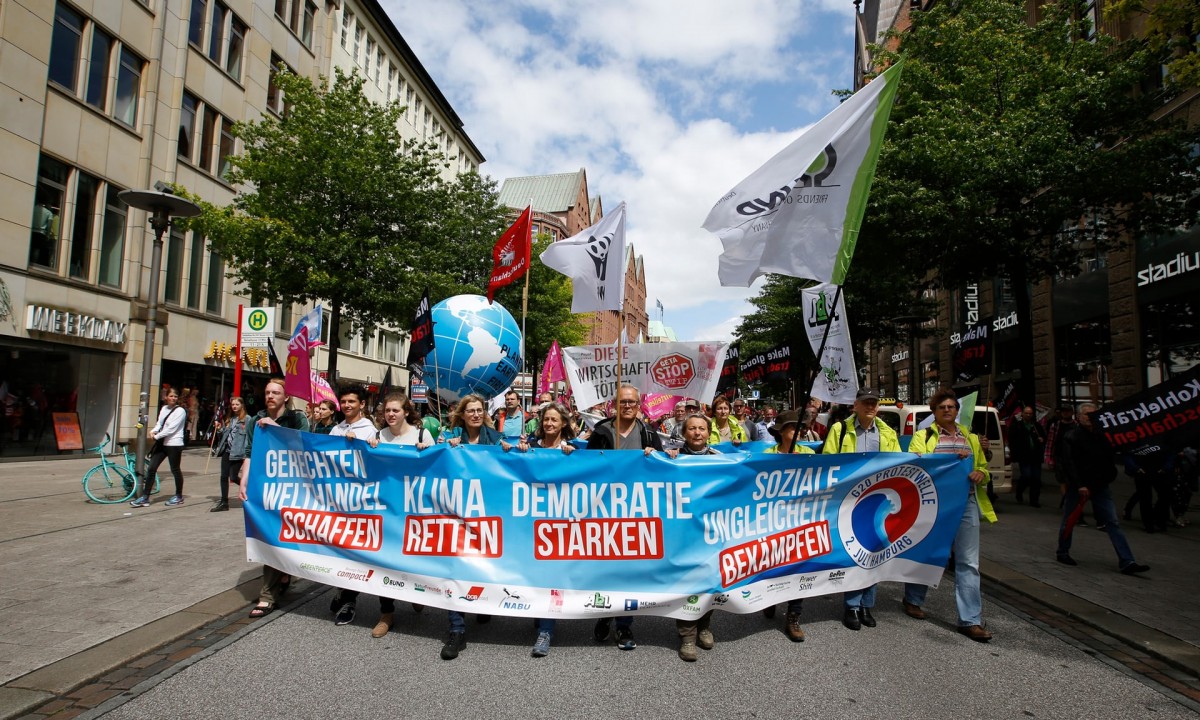
Protesters plan to take advantage of the decision to hold this week’s G20 summit in a crowded inner-city area of Hamburg and copy police crowd control tactics to “kettle Trump, Putin and Erdoğan”.
Authorities in Germany’s second-largest city are preparing for the arrival of an unprecedented line-up of controversial world leaders, as well as protest groups eager to voice dissent on 7 and 8 July.
Donald Trump and Vladimir Putin will meet at the summit, and Germany will try to push climate change and free trade to the top of the agenda.
The chancellor, Angela Merkel, has argued that her birthplace, a wealthy port city and a “beacon of free trade”, was “almost predestined” to host the gathering of the world’s leading industrialised and developing economies.
But the decision to hold it at a congress centre in a densely populated part of the inner city, bordering a district with a long-running history of anti-establishment protests and annual May Day riots, has put police services on high alert.
On Sunday night, the first of a series of protest marches culminated in clashes with police over a disputed campsite in one of the city’s park areas. Several people were reportedly injured and one person was arrested.
Jan Reinicke, of the Association of Criminal Police, told the Guardian: “Many of my colleagues and I find it incomprehensible that another big city has been chosen for such a gathering after the terrible events of Genoa. Why Hamburg when you could have held the G20 in, say, a forest in Bavaria or on Heligoland?”
The 2001 G8 summit in the Italian port city was overshadowed by clashes between police and an estimated 200,000 demonstrators, and the death of a 23-year-old Italian anti-globalisation protester, Carlo Giuliani.
Hamburg authorities have said they expect about half the numbers of protesters that descended on Genoa in 2001, but the presence of divisive political figures such as Trump and his Turkish counterpart, Recep Tayyip Erdoğan, is likely to draw protesters from a wide range of political causes.
A “G20 not welcome” march on Saturday is expected to attract between 50,000 and 100,000 members of anti-fascist, feminist and Kurdish groups, as well as climate activists. A separate protest march, “Hamburg Shows Attitude”, has been organised by a range of cultural and social institutions in the city.
Police have expressed particular concern about Thursday afternoon’s “Welcome to Hell” march, expected to draw up to 8,000 anarchists and leftwing radicals.
The congress centre borders the densely populated Schanzenviertel district on its western and southern edge, and rail tracks prohibit access from the north, meaning delegates will probably only be able to enter the venue from the west.
Faced with a growing number of registered protest marches, police announced an assembly ban within a 38 square kilometre zone stretching from the airport to the conference centre. Protest groups and politicians from the Green party and leftwing Die Linke have tried to appeal against the ban.
Hamburg’s centre-left city senate had previously rejected police proposals for a wholesale ban on demonstrations in the city centre, reportedly because of concerns that German politicians could not be seen to be cracking down on freedom of speech on their own doorstep while decrying its absence in other countries, such as Russia.
“There will be 20 delegations, each of which will need a choice of three secured routes into the centre, in case of emergency changes of plan,” Reinicke said. “The potential risk scenarios are varied and hard to predict. Of course the concern is that the violence in the inner-city areas could escalate and we end up with another Genoa.”
Hamburg police have said they would not tolerate violent behaviour of the kind displayed by Erdoğan’s bodyguards during his recent Washington visit. “On the streets of Hamburg we are the sole authority,” said police president Ralf Martin Meyer. “We would certainly take action against something like this, including taking people into detention if they lash out against third parties.”
Protest organisers aim to take advantage of the urban setting by finding creative ways to block access in and out of the summit venue. Under the “Block G20” banner, demonstrators plan to host table tennis tournaments, outdoor cinema screenings and street raves on the main arteries leading in and out of the complex. A “Colourful Mass” bike ride is also intended to obstruct traffic.
“Protesters are used to being kettled [a police tactic used to contain crowds during demonstrations],” said Emily Laquer, a spokesperson for the march being held on Saturday. “At the G20, we’re going to turn the tables on Trump, Putin and Erdoğan.”
Hamburg’s interior senator, Andy Grote, a member of the Social Democratic party, has said protesters could risk their lives if they got in the way of a motorcade carrying a head of state. “Security forces will see every hold-up as a major emergency, even if it’s just because of a harmless demonstration. They won’t stop under any circumstances,” he said.
Organisers behind the Block G20 protests have dismissed such concerns as scaremongering, arguing that their activities will not directly target politicians but aim to disrupt the proceedings of the summit.
“Trump and co should be able to be helicoptered into the conference centre either way,” said Nico Berg, a spokesperson for Block G20. “But we will make sure that his sherpas with the paperwork, the press entourage and the lunchtime catering won’t be able to join them there.”
3 WAYS TO SHOW YOUR SUPPORT
- Log in to post comments

















